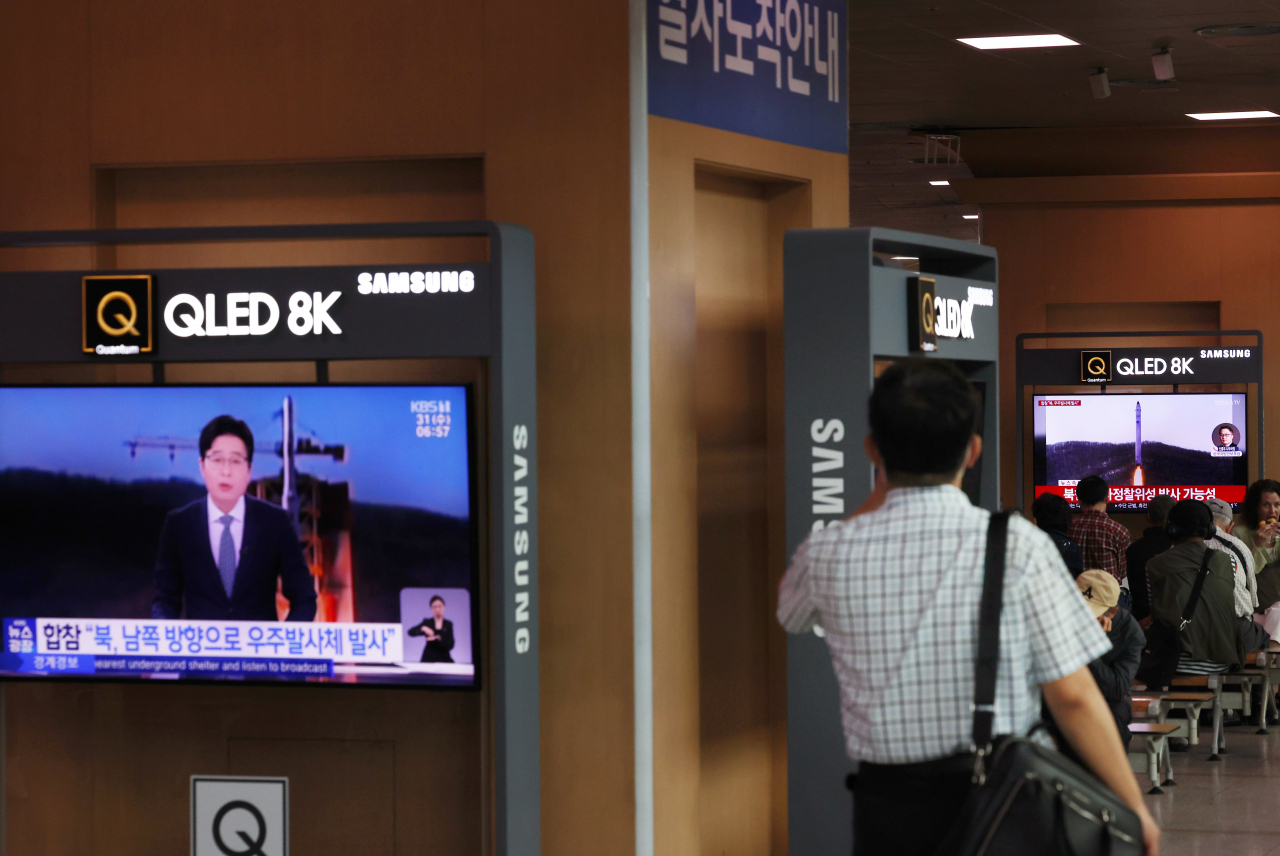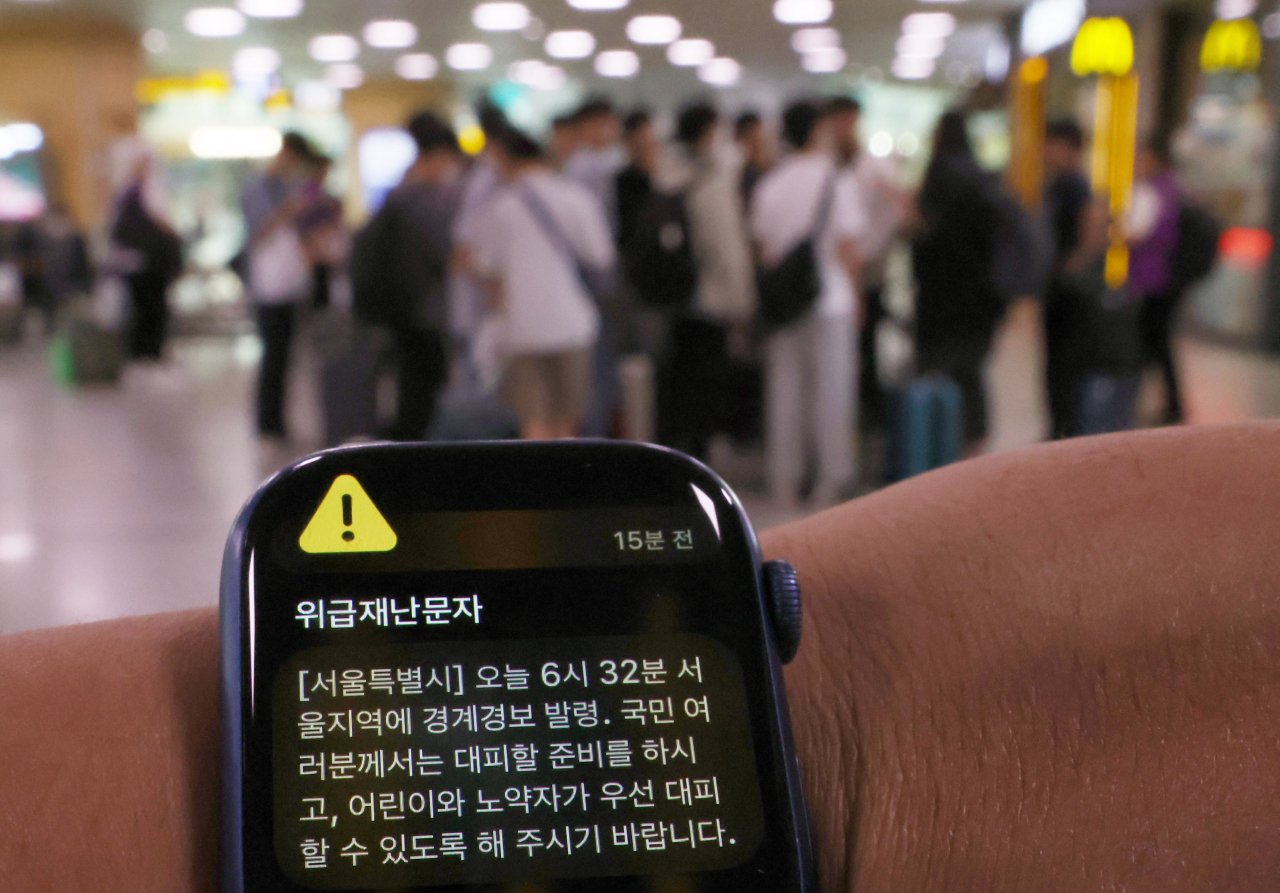Evacuation alerts send Seoulites into panic
Citizens say disaster alert left them baffled, not knowing where to go
By Park Jun-hee, Lee Jung-younPublished : May 31, 2023 - 14:34

Confusion, frustration and fear were what Lee Hyun-jung felt early Wednesday morning after she received a mobile emergency alert and heard sirens outside calling for Seoulites to evacuate following the news that North Korea had attempted to launch a space satellite.
The sirens started at 6:32 a.m, with the city issuing a “Presidential Alert” to all Seoul residents to prepare for a potential evacuation. However, 20 minutes later the Interior Ministry sent a correction. “Notice that the alert issued by the Seoul Metropolitan Government was issued incorrectly,” it said.
“At first, I panicked after hearing the ‘beep’ siren sound that kept on ringing on my phone. I immediately grabbed my (car) keys and actually packed up for evacuation since I was told to evacuate, although I didn’t even know where to shelter myself at that time, and contemplated for a moment if I had to send my children to school,” a 42-year-old housewife surnamed Lee told The Korea Herald.
“Also, I couldn’t access Naver’s mobile page for a few minutes, which left me even more baffled and frustrated not knowing where to receive information and check if the news was true or false. But I was even more frustrated after knowing the message was sent erroneously to those only living in Seoul,” Lee added.
Lee Yoon-ji, a 29-year-old office worker, was another Seoulite confused by the online portal’s brief disruption as she prepared for work.
“I was terrified for a moment because I heard that internet access would be the first thing that would be cut off if a war broke out,” she said.
“I was even more confused because I live alone in Seoul, so there was no one to share about the situation with. I realized I had no idea where to evacuate or what to prepare for a disaster. It would’ve been dangerous if it was a real emergency,” Lee added.
When the alert message was issued, Kim, a 25-year-old worker who wished to be identified by her surname, saw herself packing an emergency kit to prepare for evacuation.
“I didn’t know what to pack, so I filled my bag with daily necessities such as water, snacks, tissues, and simple clothes, but I was later informed that the alarm was wrong. I felt a sense of relief then, but couldn’t understand how administrative agencies could make such mistakes,” said 25-year-old Kim.
Kim Jansen, a 22-year-old university student in Seoul, also woke up to the wrong emergency alert early Wednesday morning, saying that she had initially prepared for the worst to happen.
“I had no clue when I got the alarm at around 6:44 a.m. I first thought it was a natural disaster and was worried about not knowing where to go because the subway stations (near my house) are above ground,” Kim told The Korea Herald.
“I couldn’t grasp what was happening because I didn’t see people outside, although I was notified later that the message was sent in error. But what if (North Korea’s launch) actually happened? Wouldn’t the correction be too late since Seoul is close to the border? Apart from the inaccuracy, the message should have also contained information about emergency evacuation procedure,” Kim added.

The inaccurate emergency and evacuation warnings also rattled Paul, a software engineer in Seoul from Germany.
“Nobody would know what to do when they get notified by an alarming message at 6:30 a.m. It was my first time receiving an alarm (regarding North Korea), and it was difficult for me to estimate the gravity of the situation since foreigners need extra time to translate or find information,” Paul told The Korea Herald.
“I checked Twitter to see how my friends took the situation, but nobody seemed to take it seriously, while some Koreans didn’t know how to react as they were busy asking ‘Where is the shelter’ on Twitter,” he said.
The words “alert” and “evacuation” were the most trending words among Twitter users in South Korea on Wednesday morning, with people expressing confusion over the situation and where to evacuate.
Seo Dong-hyun, an office worker in his 30s, echoed the importance of accuracy and clarity in the case of an emergency, explaining that the absence of warning systems amid a possible disaster left him feeling irritated.
“I was annoyed that the alert text didn’t contain information about the exact evacuation method or how to locate evacuation locations,” Seo said.
“I was busy preparing for work, and didn’t know what to do because the internet didn’t work, and I couldn’t be updated quickly about the situation through the news. Every news program was just as usual, as if nothing had happened, which confused me,” Seo added.







![[Graphic News] More Koreans say they plan long-distance trips this year](http://res.heraldm.com/phpwas/restmb_idxmake.php?idx=644&simg=/content/image/2024/04/17/20240417050828_0.gif&u=)
![[KH Explains] Hyundai's full hybrid edge to pay off amid slow transition to pure EVs](http://res.heraldm.com/phpwas/restmb_idxmake.php?idx=644&simg=/content/image/2024/04/18/20240418050645_0.jpg&u=20240419100350)







![[From the Scene] Monks, Buddhists hail return of remains of Buddhas](http://res.heraldm.com/phpwas/restmb_idxmake.php?idx=652&simg=/content/image/2024/04/19/20240419050617_0.jpg&u=20240419175937)

![[KH Explains] Hyundai's full hybrid edge to pay off amid slow transition to pure EVs](http://res.heraldm.com/phpwas/restmb_idxmake.php?idx=652&simg=/content/image/2024/04/18/20240418050645_0.jpg&u=20240419100350)

![[Today’s K-pop] Illit drops debut single remix](http://res.heraldm.com/phpwas/restmb_idxmake.php?idx=642&simg=/content/image/2024/04/19/20240419050612_0.jpg&u=)